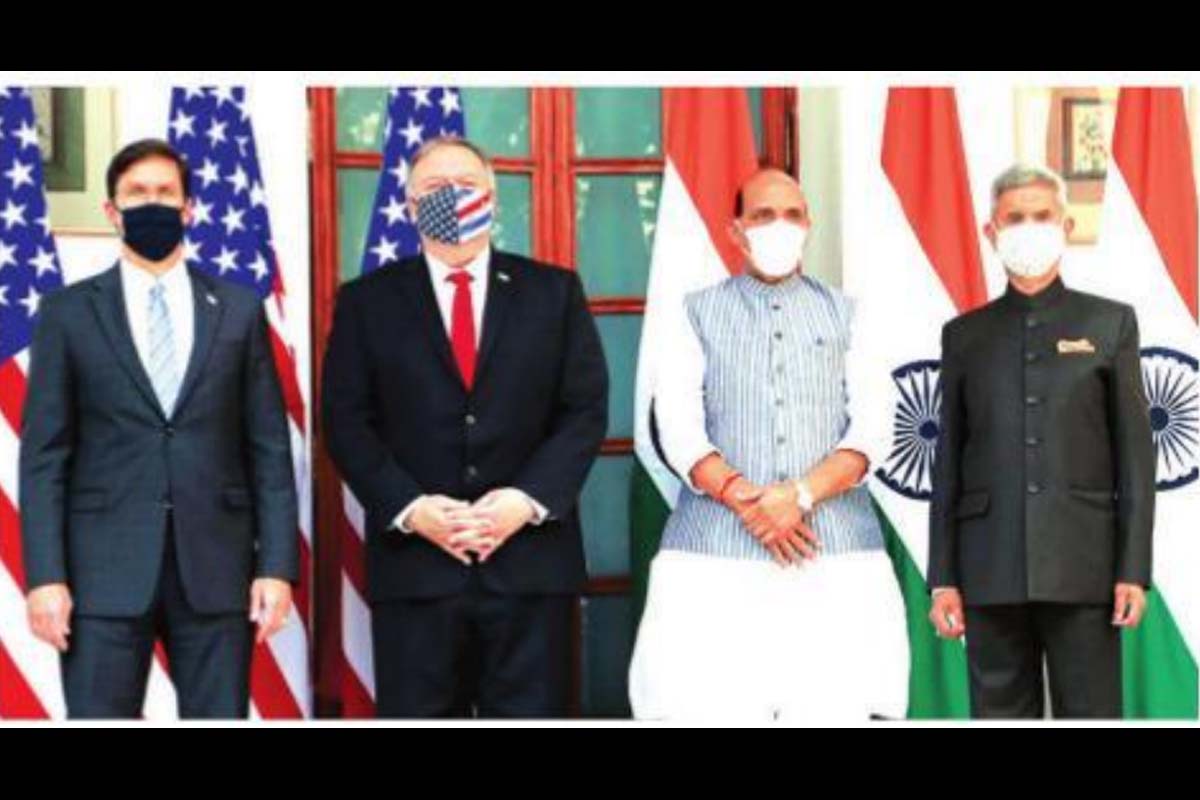Consolidating their multifaceted relationship, India and the USA today signed five accords, including the Basic Exchange and Cooperation Agreement (BECA) that will provide India access to crucial information in any potential military conflict, as US Secretary of State Mike Pompeo said that the two countries were strengthening cooperation to meet any threat from China.
“I am glad to say the United States and India are taking steps for cooperation against all manners of threats and not just those posed by the Chinese Communist Party. Our leaders and our citizens see with increasing clarity that the Chinese Communist Party is no friend to democracy, the rule of law, transparency, the freedom of navigation [which is] the foundation of a free and prosperous Indo-Pacific,” said Pompeo in hard-hitting remarks against Beijing at a joint press conference with Defence Minister Rajnath Singh, External Affairs Minister S Jaishankar and US Secretary of Defence Mark T Esper at the end of the third India-US ‘2+2’ ministerial dialogue.
Advertisement
The US Secretary of State indicated that China’s aggressive posturing against all its neighbours was discussed at length during the dialogue in the context of global developments. He said he and Esper had also visited the National War Memorial in New Delhi to honour men and women of the Indian armed forces, including the 20 soldiers killed by Chinese troops at the Galwan Valley in eastern Ladakh on 15 June.
‘’The US stands with India as they confront threats to their sovereignty, liberty,’’ the American leader added in an obvious reference to the ongoing Sino-Indian military stand-off at eastern Ladakh.
Even as Pompeo reiterated that Covid-19 originated from Wuhan in China, the two countries reaffirmed their resolve to jointly confront challenges emerging from the pandemic.
Esper too expressed solidarity with India in the face of its border row with China.
‘’Based on our shared values and common interests, we stand shoulder-toshoulder in support of a free and open Indo-Pacific for all, particularly in light of increasing aggression and destabilising activities by China,’’ he said.
The Indian ministers, however, carefully avoided any direct reference to China but both of them reiterated the importance of peace, stability and prosperity for all countries in this IndoPacific region where Beijing is locked in maritime disputes with a number of countries.
In the context of Pakistan, a joint statement said the two countries called on Islamabad to take immediate, sustained and irreversible action to ensure that no territory under its control was used for terrorist attacks, and to expeditiously bring to justice the perpetrators and planners of all such attacks, including 26/11 Mumbai, Uri, and Pathankot.
Jaishankar made it clear to the American side that cross-border terrorism was completely unacceptable to India. On Afghanistan, Jaishankar told the American ministers that India’s stakes in its security and stability was evident as also New Delhi’s willingness to contribute to international efforts to that end.
For his part, Rajnath Singh said the two countries explored probable capacity building and other joint cooperation activities in third countries, including the neighbourhood and beyond. As far as the accords between the two sides are concerned, BECA is the fourth and final “foundational” understanding the USA has with India to promote geo-spatial cooperation, allowing New Delhi access to a range of topographical, nautical and aeronautical data considered key to map hostile movements and precise and real-time information on enemy positions accessed from US military satellites during a potential border conflict.
The other agreements are on cooperation in earth observations and earth sciences; nuclear energy, electronic exchange of customs data between postal operators and research in the field of ayurveda and cancer.











